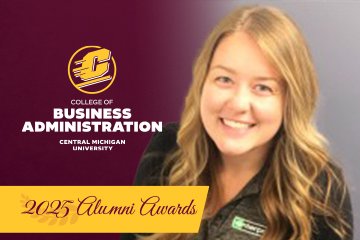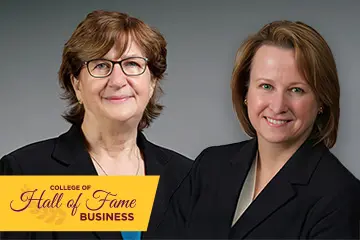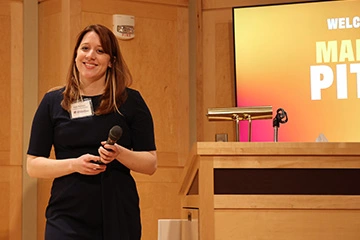Solving real problems, not just symptoms
CMU’s Lean Six Sigma workshops equip students and professionals to lead with data, improve processes, and drive meaningful change.
For College of Business faculty member Kevin McCarron, Lean Six Sigma isn’t just a toolkit — it’s a mindset. It’s about shifting from putting out fires to preventing them in the first place.
“A lot of classes talk about project management,” said McCarron, a certified master black belt and CMU faculty member. “But they never teach you project management. This is a formal education in that — combined with the tools and techniques to make real, lasting improvements.”
At its core, Lean Six Sigma is a process improvement methodology that helps individuals and organizations identify inefficiencies, reduce defects, and improve performance. It’s rooted in a structured approach called DMAIC: Define, Measure, Analyze, Improve, and Control — a cycle designed to solve root problems, not just surface-level issues.
“All too often, people jump in and try to fix things by addressing symptoms,” McCarron said. “This helps you slow down, think critically, and find the actual cause — and then fix it.”
Two tracks, real impact
CMU’s Lean Six Sigma offerings include two certification paths — Yellow Belt and Green Belt — delivered through flexible, competitively priced workshops that blend lecture with hands-on simulation.
The Yellow Belt is designed for those who want to contribute to a project team and understand key tools and techniques, while the Green Belt goes further by teaching participants to lead improvement projects and apply project management fundamentals.
“The Green Belt is more involved,” McCarron explained. “You’re learning the full process and running a simulated project. You have deliverables and an exam. It’s intensive — but that’s what makes it valuable.”
Participants complete the certification over several days, with a mix of structured lectures and practical application. While the workshops are intense, McCarron said they’re designed to be approachable, especially for professionals with real-world experience.
“If someone’s committed to learning, they’ll succeed. We provide the tools, the structure, and support — and you come out of it with a credential that shows you can solve problems and manage projects.”
Skills that employers notice
Lean Six Sigma certifications, especially at the Green Belt level, are increasingly sought after by employers in manufacturing, logistics, healthcare, and beyond.
“I’ve had students who told employers they’d be Green Belt certified before graduation — and they walked into a quality improvement job the next day,” McCarron said. “Others come back and say, ‘My boss only wanted to talk about the Green Belt.’ That’s what they were excited about.”
Because the training is led by industry-certified master black belts, CMU’s program provides credentials that stand out — and skills that transfer.
“We teach project management, problem-solving, and data analytics,” McCarron said. “Those three things apply across industries, across roles. It’s a universal skillset.”
Built for real-world application
McCarron said Lean Six Sigma changes how people think. Instead of rushing into fixes, participants learn to define problems clearly, collect meaningful data, and implement sustainable solutions.
“It gives people a more methodical, structured approach. They’re not just polishing the surface. They’re digging in and fixing the real problem,” he said.
Even better — the workshops are HyFlex, so participants can attend in person or remotely. While there are some activities, like paper drone simulations, that are better experienced live, McCarron ensures remote attendees still gain full value through guided group work and access to complete datasets.
“We’ve been doing this for 12 years and have certified over 1,000 belts,” he said. “It’s a practical, proven approach — and we want to make it accessible.”
Who should consider Lean Six Sigma?
McCarron doesn’t hesitate: “Everyone.”
While popular among engineering, business, and supply chain professionals, Lean Six Sigma has applications in any field that values efficiency and continuous improvement.
“You don’t have to accept the status quo,” he said. “Lean Six Sigma gives you the tools to question why something is the way it is — and then improve it.”
For students looking to stand out, or professionals ready to lead change, CMU’s Lean Six Sigma workshops offer more than a certificate. They offer proof — of skill, leadership, and problem-solving potential.
Ready to build your Lean Six Sigma credentials? Visit our website to learn more about upcoming workshop dates, certification options, and how to register.




